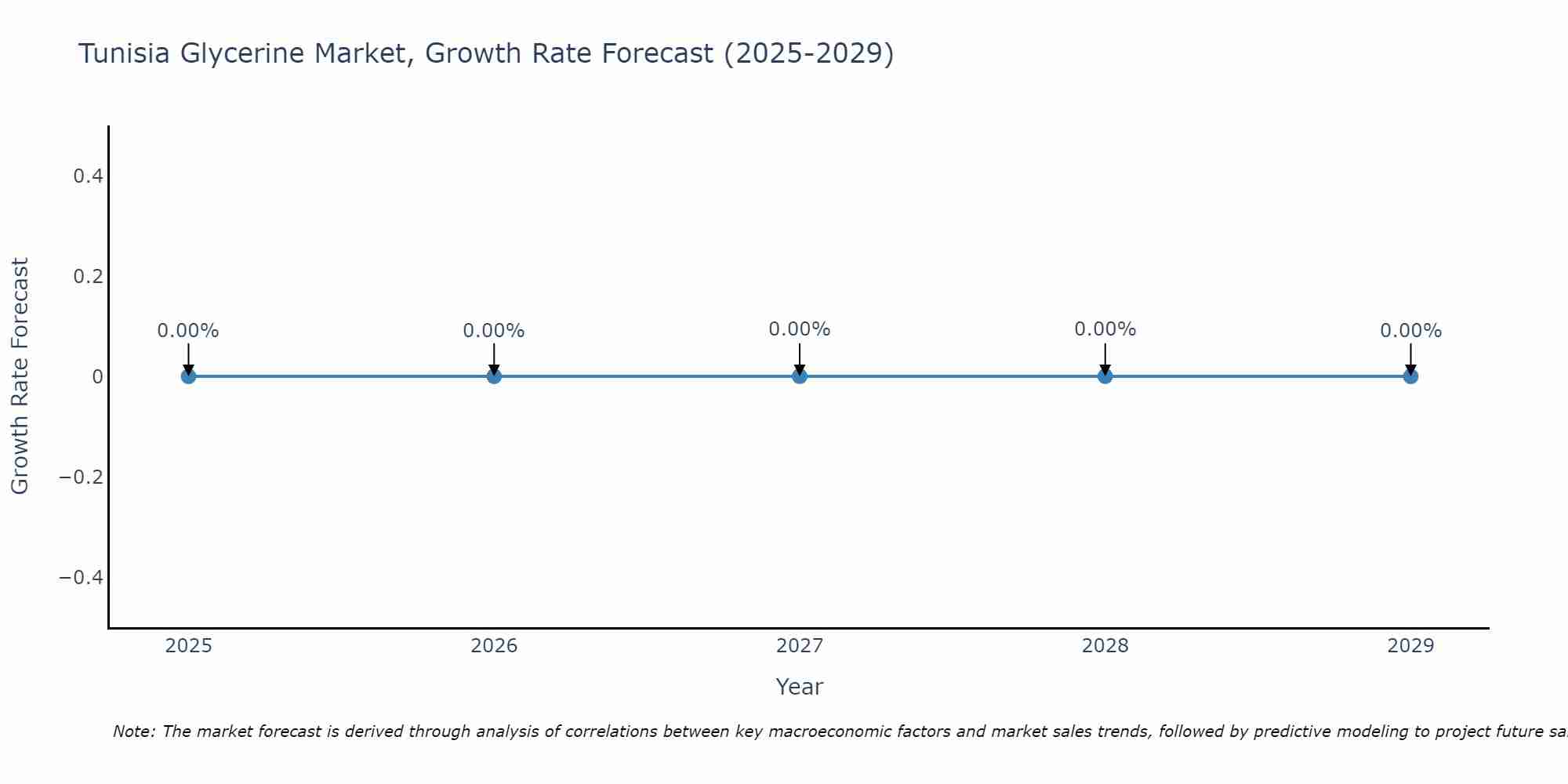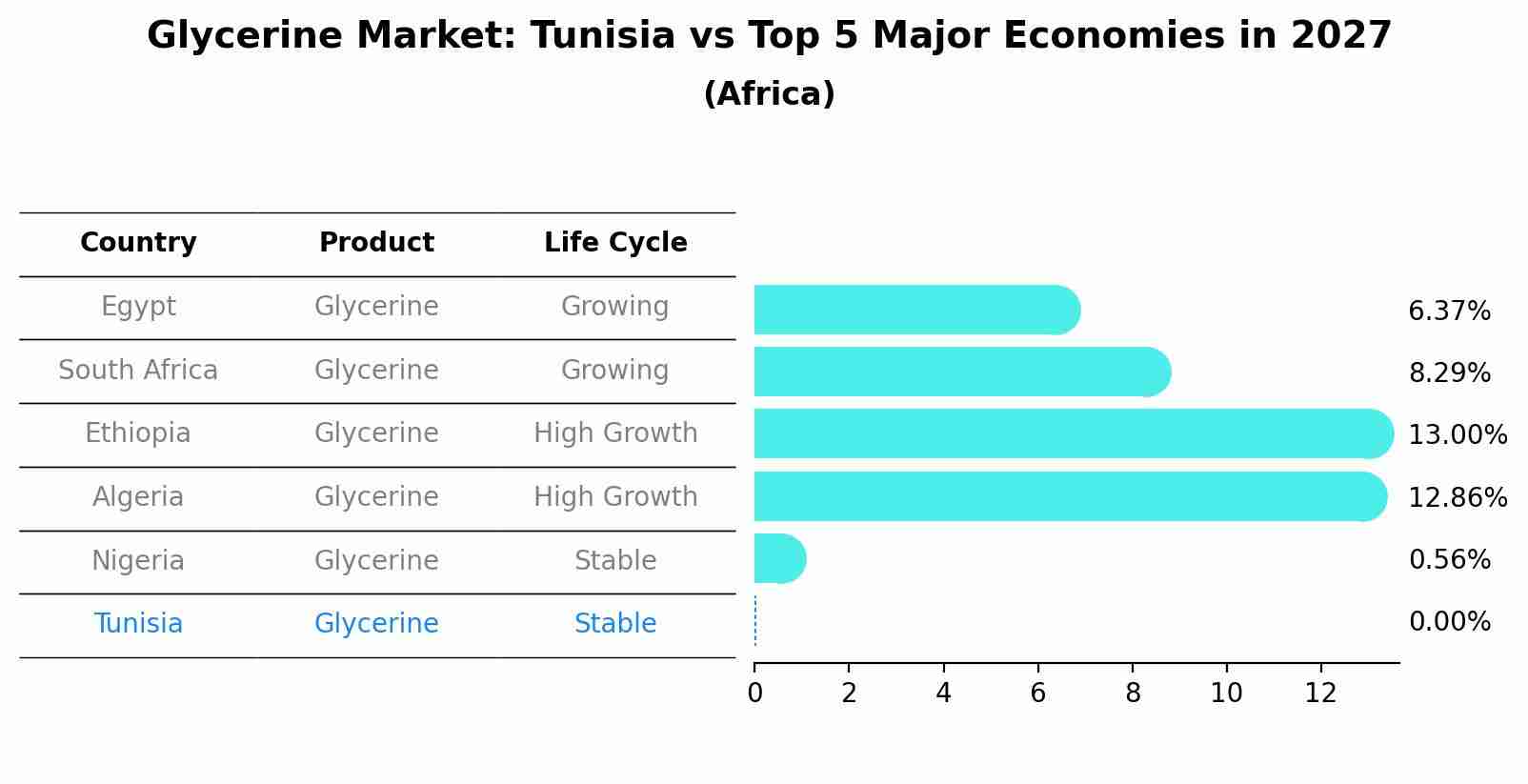Tunisia Glycerine Market (2025-2031) Outlook | Share, Trends, Industry, Growth, Analysis, Forecast, Revenue, Value, Companies & Size
| Product Code: ETC326754 | Publication Date: Aug 2022 | Updated Date: Apr 2025 | Product Type: Market Research Report | |
| Publisher: 6Wresearch | Author: Shubham Padhi | No. of Pages: 75 | No. of Figures: 35 | No. of Tables: 20 |
Tunisia Glycerine Market Size Growth Rate
The Tunisia Glycerine Market is projected to witness mixed growth rate patterns during 2025 to 2029. Starting at 0.00% in 2025, the market peaks at 0.00% in 2027, and settles at 0.00% by 2029.

Glycerine Market: Tunisia vs Top 5 Major Economies in 2027 (Africa)
By 2027, Tunisia's Glycerine market is forecasted to achieve a stable growth rate of 0.00%, with Egypt leading the Africa region, followed by South Africa, Ethiopia, Algeria and Nigeria.

Tunisia Glycerine Market Overview
The Tunisia Glycerine Market is synonymous with the glycerin market, covering the same versatile applications in pharmaceuticals, cosmetics, food, and industrial sectors.
Drivers of the market
The glycerine market in Tunisia is driven by several key factors contributing to its growth trajectory. Firstly, glycerine serves as a versatile chemical ingredient with widespread applications across industries such as personal care, pharmaceuticals, food products, and industrial manufacturing. Its properties as a moisturizer, stabilizer, and sweetener make it indispensable in various formulations. Secondly, the increasing demand within the personal care and cosmetics industry for products that enhance skin hydration and texture supports market expansion. Thirdly, the emphasis on sustainable and natural ingredients in consumer products further boosts glycerine`s demand, as it can be derived from natural fats and oils. Lastly, advancements in glycerine production technologies that improve efficiency and purity contribute to the market`s overall growth and competitiveness.
Challenges of the market
The Glycerine Market in Tunisia faces difficulties related to raw material availability and production efficiency. Ensuring a consistent supply of high-quality raw materials for glycerine production can be challenging due to agricultural limitations. Additionally, the market needs to invest in advanced production techniques to produce high-quality glycerine products.
Government Policy of the market
The Tunisian government is committed to supporting the glycerine market through a range of policies aimed at promoting sustainable production and industrial growth. This includes providing financial incentives and subsidies to local manufacturers who adopt environmentally friendly production methods. Additionally, the government invests in research and development initiatives to discover new applications and improve the efficiency of glycerine production processes. Regulatory frameworks are also established to ensure that glycerine products meet international quality and safety standards, enhancing their competitiveness in both local and global markets.
Key Highlights of the Report:
- Tunisia Glycerine Market Outlook
- Market Size of Tunisia Glycerine Market, 2024
- Forecast of Tunisia Glycerine Market, 2031
- Historical Data and Forecast of Tunisia Glycerine Revenues & Volume for the Period 2021-2031
- Tunisia Glycerine Market Trend Evolution
- Tunisia Glycerine Market Drivers and Challenges
- Tunisia Glycerine Price Trends
- Tunisia Glycerine Porter's Five Forces
- Tunisia Glycerine Industry Life Cycle
- Historical Data and Forecast of Tunisia Glycerine Market Revenues & Volume By Grade for the Period 2021-2031
- Historical Data and Forecast of Tunisia Glycerine Market Revenues & Volume By USP Grade for the Period 2021-2031
- Historical Data and Forecast of Tunisia Glycerine Market Revenues & Volume By Technical Grade for the Period 2021-2031
- Historical Data and Forecast of Tunisia Glycerine Market Revenues & Volume By Application for the Period 2021-2031
- Historical Data and Forecast of Tunisia Glycerine Market Revenues & Volume By Personal Care for the Period 2021-2031
- Historical Data and Forecast of Tunisia Glycerine Market Revenues & Volume By Food & Beverages for the Period 2021-2031
- Historical Data and Forecast of Tunisia Glycerine Market Revenues & Volume By Pharmaceuticals for the Period 2021-2031
- Historical Data and Forecast of Tunisia Glycerine Market Revenues & Volume By Polyether Polyols for the Period 2021-2031
- Historical Data and Forecast of Tunisia Glycerine Market Revenues & Volume By Chemical Intermediate for the Period 2021-2031
- Historical Data and Forecast of Tunisia Glycerine Market Revenues & Volume By Tobacco for the Period 2021-2031
- Historical Data and Forecast of Tunisia Glycerine Market Revenues & Volume By Others for the Period 2021-2031
- Tunisia Glycerine Import Export Trade Statistics
- Market Opportunity Assessment By Grade
- Market Opportunity Assessment By Application
- Tunisia Glycerine Top Companies Market Share
- Tunisia Glycerine Competitive Benchmarking By Technical and Operational Parameters
- Tunisia Glycerine Company Profiles
- Tunisia Glycerine Key Strategic Recommendations
Frequently Asked Questions About the Market Study (FAQs):
- Single User License$ 1,995
- Department License$ 2,400
- Site License$ 3,120
- Global License$ 3,795
Search
Thought Leadership and Analyst Meet
Our Clients
Related Reports
- Germany Breakfast Food Market (2026-2032) | Industry, Share, Growth, Size, Companies, Value, Analysis, Revenue, Trends, Forecast & Outlook
- Australia Briquette Market (2025-2031) | Growth, Size, Revenue, Forecast, Analysis, Trends, Value, Share, Industry & Companies
- Vietnam System Integrator Market (2025-2031) | Size, Companies, Analysis, Industry, Value, Forecast, Growth, Trends, Revenue & Share
- ASEAN and Thailand Brain Health Supplements Market (2025-2031) | Strategy, Consumer Insights, Analysis, Investment Trends, Opportunities, Growth, Size, Share, Industry, Revenue, Segments, Value, Segmentation, Supply, Forecast, Restraints, Outlook, Competition, Drivers, Trends, Demand, Pricing Analysis, Competitive, Strategic Insights, Companies, Challenges
- ASEAN Bearings Market (2025-2031) | Strategy, Consumer Insights, Analysis, Investment Trends, Opportunities, Growth, Size, Share, Industry, Revenue, Segments, Value, Segmentation, Supply, Forecast, Restraints, Outlook, Competition, Drivers, Trends, Demand, Pricing Analysis, Competitive, Strategic Insights, Companies, Challenges
- Europe Flooring Market (2025-2031) | Outlook, Share, Industry, Trends, Forecast, Companies, Revenue, Size, Analysis, Growth & Value
- Saudi Arabia Manlift Market (2025-2031) | Outlook, Size, Growth, Trends, Companies, Industry, Revenue, Value, Share, Forecast & Analysis
- Uganda Excavator, Crane, and Wheel Loaders Market (2025-2031) | Strategy, Consumer Insights, Analysis, Investment Trends, Opportunities, Growth, Size, Share, Industry, Revenue, Segments, Value, Segmentation, Supply, Forecast, Restraints, Outlook, Competition, Drivers, Trends, Demand, Pricing Analysis, Competitive, Strategic Insights, Companies, Challenges
- Rwanda Excavator, Crane, and Wheel Loaders Market (2025-2031) | Strategy, Consumer Insights, Analysis, Investment Trends, Opportunities, Growth, Size, Share, Industry, Revenue, Segments, Value, Segmentation, Supply, Forecast, Restraints, Outlook, Competition, Drivers, Trends, Demand, Pricing Analysis, Competitive, Strategic Insights, Companies, Challenges
- Kenya Excavator, Crane, and Wheel Loaders Market (2025-2031) | Strategy, Consumer Insights, Analysis, Investment Trends, Opportunities, Growth, Size, Share, Industry, Revenue, Segments, Value, Segmentation, Supply, Forecast, Restraints, Outlook, Competition, Drivers, Trends, Demand, Pricing Analysis, Competitive, Strategic Insights, Companies, Challenges
Industry Events and Analyst Meet
Whitepaper
- Middle East & Africa Commercial Security Market Click here to view more.
- Middle East & Africa Fire Safety Systems & Equipment Market Click here to view more.
- GCC Drone Market Click here to view more.
- Middle East Lighting Fixture Market Click here to view more.
- GCC Physical & Perimeter Security Market Click here to view more.
6WResearch In News
- Doha a strategic location for EV manufacturing hub: IPA Qatar
- Demand for luxury TVs surging in the GCC, says Samsung
- Empowering Growth: The Thriving Journey of Bangladesh’s Cable Industry
- Demand for luxury TVs surging in the GCC, says Samsung
- Video call with a traditional healer? Once unthinkable, it’s now common in South Africa
- Intelligent Buildings To Smooth GCC’s Path To Net Zero


















